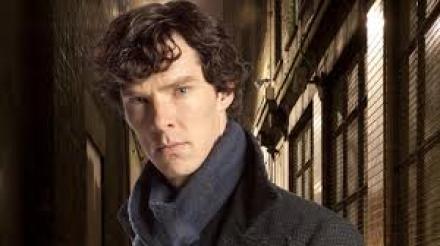
I came across my interview with Benedict Cumberbatch from The Times, November 2007, in my archive and thought it might be of some interest. Back then Cumberbatch was a fast-rising star of stage and screen rather than the all-conquering superstar he is today. I'll always remember the first time I spotted him – it was when I watched him playing Stephen Hawking in a BBC drama in 2004. I remember it partly for his committed performance, but mainly, if I'm honest, because I watched it on a portable TV in the back of a campervan on a camp site near Longleat Wildlife Park with lions roaring in the distance.
Cumberbatch was about to star in The Arsonists at the Royal Court Theatre when I interviewed him. He was extremely easy going and friendly and apart from knowing him from Hawking I knew I'd seen him before but could not work out where. Then I twigged. His girlfriend back then was Olivia Poulet who I'd seen in a comedy show in Edinburgh. Cumberbatch said that he had probably been in the audience the same night. He enthusiastically told me how much he loves comedy and always tries to catch as much as he can in Edinburgh.
Unlike his Sherlock co-star Martin Freeman, Cumberbatch hasn't done a lot of comedy over the years, but he was great as the control freak swot in Starter for Ten, appeared in Four Lions as a negotiator and recently played Prime Minister Severus Snape in The Simpsons. He said this week in a Reddit webchat that he'd like to do more comedy: "I love my comedy and when the right project comes up I won't shy away from it. There's a lot of humour in what I do, specifically Sherlock, but it would be great to play a 'normal guy' in a 'normal comedy'." He is one of those actors, like Rory Kinnear, who can do modern, classic, sci-fi, cartoons, pretty much anything they turn their hands to. I think we'll be seeing more of him...
OK, let’s get the name out of the way first. Benedict Cumberbatch. Three syllables. Twice. It even beats Rasmus Hardiker, who played Steve Coogan’s sidekick in Saxondale, in the rising-star-with-a-mouthful-for-a-name stakes. It isn’t as ridiculous as the Celtic FC striker Jan Vennegoor of Hesselink, but it must have been concocted as some kind of joke. Surely?
“It’s actually my real family name,” says Cumberbatch, between forkfuls of fish salad backstage at the Royal Court. “When I first started I used the same surname Carlton that my father Timothy, who is an actor, uses. But I wasn’t getting very far and when I changed agents, my new agent suggested I revert. I thought Benedict Cumberbatch sounded a bit bumbly and messy, but they said it’s a great name, it will get people talking about you.”
It has proved an inspired move. After trundling along after leaving Lamda, Cumberbatch is going through a purple patch that started with his 2004 Bafta-nominated breakthrough role as Stephen Hawking in the BBC drama that charted the scientist’s life.
Roles in the Chris Morris sitcom Nathan Barley, the university quiz movie Starter for 10 and the seafaring epic To the Ends of the Earth consolidated his reputation, and now things are really moving. He played the rapist cad Paul Marshall in Atonement, made waves in the BBC’s Stuart: A Life Backwards and is soon due to appear opposite Scarlett Johansson in Justin Chadwick’s sumptuous movie The Other Boleyn Girl.
All of which is not bad for someone whose parents – his mother is the actress Wanda Ventham – tried to put him off anything to do with performance, sending him to Harrow in the hope that a decent education might disabuse him of any showbiz notions. Instead, he ended up playing Shakespeare’s fairy queen Titania at school and could not stay away from the stage. Now he is treading the boards again in not one but two productions, starring in Eugène Ionesco’s Rhinoceros and Alistair Beaton’s adaptation of Max Frisch’s The Arsonists.
The two absurdist dramas are running concurrently in rep, which makes sense as the themes intertwine. Rhinoceros nails the nature of peer pressure and conformity, as the residents of a French town gradually turn into huge, grey-horned beasts. Only Berenger (Cumberbatch) makes a stand. In The Arsonists, in its first major revival since opening at the Royal Court in 1961, Cumberbatch is Eisenring, part of a terrorist group that moves into the house of Biedermann, an upstanding citizen. And despite the group making no secret of their intentions, their host refuses to acknowledge what is going on, even as petrol drums pile up in the corner.
If Rhinoceros is a straightforward allegory for the rise of extremism,The Arsonists is a more ambiguous text. Cumberbatch, all sprinklings of swearing and gangly, nervous energy – one critic once called him “a meerkat caught on the hop” – explains that it has been updated to give it more resonance, but not too much. “We are not walking around with mobiles and laptops like they always f**king do with Shakespeare.”
The play could feasibly be read as a scaremongering post 7/7 rightwing text, saying that outsiders should not be trusted. But Cumberbatch – and Beaton, whom I speak to for clarification later – sees it more as an attack on the liberal Left’s appeasement. “I think it is a critique of a certain kind of tolerance in a pluralistic society which means that everyone has their shout and no one takes a stand about things which are fundamentally wrong. Within tolerance you still have to have limits, otherwise you are inviting your own destruction.”
Click "next" below on the right to get more Cumberbatch...



